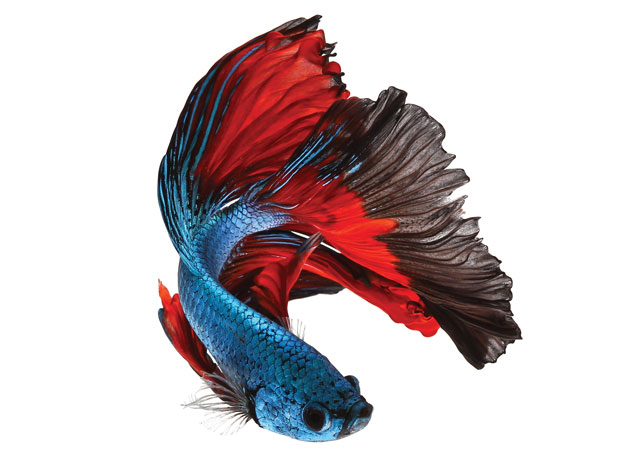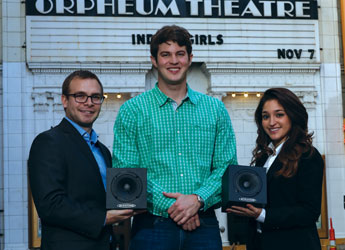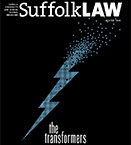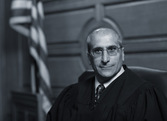
Small Fish Bite Back
From a tiny windowless office in Sargent Hall, an adviser and eight Suffolk Law students defend the little guys against trademark bullies.
By Rachel Slade
In the students’ favor: free internet, practical courses on intellectual property law and plenty of coffee.
On the opposing side: huge bank accounts, expert lawyers and dozens of similar trademark infringement cases ending in either settlement or the demise of the small business.
AGAINST ALL ODDS, THE STUDENTS USUALLY WIN
“What I want to focus on is helping students acquire skills that make them a valuable asset as startup attorneys,” says the Intellectual Property & Entrepreneurship Clinic director Loletta Darden JD ’91, who has worked in large and small firms around the country. “That requires interdisciplinary skills. So I draw on my in-house counsel experience and government background to ground them in what’s needed to add value to a startup.”
That Suffolk Law students want to test their IP mettle defending small businesses should surprise exactly no one. These days, the bulk of college grads—including Suffolk alums—consider themselves latent entrepreneurs. But while they are pulling all-nighters and raising capital, many of these budding capitalists fail to consider the possibility that they might become embroiled in an IP dispute.
Trademark Trial and Appeal Board (TTAB) cases are notoriously pricey and demanding due to the lengthy procedural work of discovery and brief filing. Certainly, companies have a right to defend themselves from knock-offs, look-alikes and opportunists who want to make a buck from the goodwill that brands have built. But increasingly, large companies file what many regard as frivolous lawsuits against smaller organizations. They are known as “trademark bullies.”
Lacking the resources to defend themselves, small businesses nearly always settle—agreeing to rejigger their brands to appease the giant—or end up in bankruptcy. It’s the classic David versus Goliath story, and from the start, Suffolk’s clinic was set up to defend the Davids.
THE LAW ON OUR SIDE
Sifting through student applications, Darden seeks soon-to-be lawyers who would thrive in real-world situations. She also hunts for clients to keep the clinic busy, and that’s the easiest part of the job, because so many small businesses need help.
Take Lih Chih, a Maryland-based wholesale distributor with a passion for exotic predatory jumbo fish. Chih had collected them since he was a teen, and in 2005 built an online forum for other hobbyists like him to swap know-how, photos and stories.
His troubles began seven years later when he registered his trademark, MonsterFishkeepers, along with his logo—an “M” with a Neptune-like flourish—and printed up swag to sell at trade shows. In short order, a strongly worded cease-and-desist letter from Monster Beverage Corp. arrived in his mailbox. Lacking the hundreds of thousands of dollars necessary to defend himself, Chih reached out to his 100,000 website members, one of whom contacted then-director of the clinic, Eve Brown.
Defending MonsterFishkeepers from Monster Beverage would provide Suffolk Law students ample opportunity for discovery, briefwriting and case-law research. Plus, they’d be challenging an unusually aggressive opponent. Monster Beverage has had a long history of using trademark law to scare away anyone daring to use the “m” word.
SEA CREATURE OR SOFT DRINK?
The notoriously litigious Monster Beverage wasn’t accustomed to having the merits of its trademark cases challenged. So when Eve Brown and the two students first assigned to the MonsterFishkeepers case, Alex Chiulli JD ’13 and Jerome (Dan) Duval JD ’13, placed that first conference call to Monster Beverage’s attorney, the attorney responded as if a couple of meddling kids were wasting her mega-client’s time. “We said that we were looking into the merits of Monster’s claims,” says Brown, “and we were blown away by the tone and conviction of the opposing party. Really antagonistic.”
“But seriously,” thought Chiulli, “who would confuse a caffeine-riddled soft drink with a website devoted to collecting sea creatures?” Chiulli says at stressful moments, he reminded himself that his lack of experience didn’t change the contours of the law. “I went in thinking: ‘The law isn’t different for me.’”
“All of the students were well-prepared,” says Brown, “and we got on the phone and the attorney just started yelling at them. Not about the case. It was straight-up bullying. I had to write the students [a note] to abort the call. There’s no reason to engage in this discourse. This isn’t what we’re about.”
Fortunately, Brown didn’t have to worry about the effect of Monster Beverage’s intimidating tactics. “When we hung up, we knew we were going to fight,” says Chiulli. “It fired me up to push back. We said, ‘OK, we have resources at our disposal and the law on our side.’”
YOUNG, HUNGRY AND TIRELESS
While the Monster case was being decided at the TTAB, 20-something Alex Jacobsen was having problems of his own. Fresh out of the University of Tennessee at Chattanooga, Jacobsen looked like a lot of the students in the IP clinic, young and full of energy—the quintessential Millennial entrepreneur. He’d just taken over his family’s company, Auratone, which manufactured and sold audio speakers. His grandfather, Jack Wilson, had founded the company, building his first cube speakers in his California garage in 1958.
 Since then, Auratone speakers had become an industry standard for checking tracks in music studios. Their unique design revealed weaknesses in the mix—problems not apparent when listening through big studio monitors. They uncovered muddiness in the middle range, tinny high-end or too much bass—issues that would be pronounced when listening through earbuds, car speakers or boomboxes. Quincy Jones used Auratones when producing Michael Jackson’s (image above) biggest hits.
Since then, Auratone speakers had become an industry standard for checking tracks in music studios. Their unique design revealed weaknesses in the mix—problems not apparent when listening through big studio monitors. They uncovered muddiness in the middle range, tinny high-end or too much bass—issues that would be pronounced when listening through earbuds, car speakers or boomboxes. Quincy Jones used Auratones when producing Michael Jackson’s (image above) biggest hits.
Wilson died in 2005 when Jacobsen was 15, and neither Jacobsen’s aunt nor mother was quite sure what to do with the company. So they shipped all of the inventory, prototypes and drawings from California to their garage in Atlanta, and built a website so that fans and clients could contact them to buy remaining stock or replacement parts.
When Jacobsen graduated from college in 2012, he pored over Wilson’s drawings and prototypes, reached out to distributors and suppliers and fired up a new website, only to discover that the trademark registration had lapsed and a large company, Music Group, based in the Philippines, had applied to take it over. Jacobsen hired a lawyer to file an opposition to registration, but after a year and a half, he was blowing more money on the lawsuit than he could invest in his company. “That’s what they want to happen,” he says of big companies like Music Group.
Music Group was a large company that wanted to take over a mark that it deemed to be nostalgic. Aurotone was a small, family-run business, on the other hand, that had built up goodwill in the market and was fighting to maintain a brand already recognized worldwide.
 After Jacobsen (center, in image at right) signed on with the clinic, Jessica Gonzalez (right, in image) JD ’16 and Devon Ramsdell (left, in image) JD ’16 began digging into hundreds of files from his lawyer. A few weeks into the semester, Music Group filed a request for summary judgment. Now the clock was ticking. Gonzalez and Ramsdell—both full-time law students—had just a couple of months to plow through the documents and case law and file a response in the middle of finals.
After Jacobsen (center, in image at right) signed on with the clinic, Jessica Gonzalez (right, in image) JD ’16 and Devon Ramsdell (left, in image) JD ’16 began digging into hundreds of files from his lawyer. A few weeks into the semester, Music Group filed a request for summary judgment. Now the clock was ticking. Gonzalez and Ramsdell—both full-time law students—had just a couple of months to plow through the documents and case law and file a response in the middle of finals.
The duo worked until midnight several nights a week, alternately losing faith and rooting for each other. It was exhausting. At first, the opposition’s strongly worded filing seemed impenetrable. But when they probed further, their opponent’s argument started to unravel, they say. Gonzalez and Ramsdell found plenty of case law to support their assertion that the trademark had not been abandoned. They argued that the mark use never stopped and that the registration merely unintentionally lapsed due to extenuating circumstances. They took the position that everyone in the industry identifies the family as the source of these handmade speakers and that there was only one source making them, so it was ludicrous that another company could swoop in and take over the mark for nostalgic purposes.
They filed their opposition to summary judgment in December 2015, then waited. And waited. Ramsdell says that at first, he checked the TTAB website daily for an update. Then weekly. Then he stopped.
Excellent news came in February 2016, but it wasn’t about Auratone: Suffolk had won the MonsterFishkeepers case and had gained national media attention in doing so, with stories about the clinic in the Washington Post and the Boston Globe.
Lih Chih was free to use his company’s name and free to keep his website. The “M” logo with the Neptune flourish will have to go—it was deemed too close to Monster Beverage’s clawed logo—but that was OK with Chih.
Deep into the spring semester, close to graduation, Ramsdell and Gonzalez received an email about the Auratone matter. Their opponent had been denied its request for summary judgment, which would have closed the matter in its favor. This was a huge initial victory for the two students, then furiously studying for the bar. The case continues this fall with a fresh Suffolk team defending Jacobsen’s right to his grandfather’s trademark.
In a city with so many entrepreneurs, high-tech and biotech among them, Darden says there’s a tremendous need for IP legal help. Many of these startups don’t have the capital to hire major firms to handle their IP work and protect their most valuable assets.
“Don’t ever try to fight a clinic,” Gonzalez says, summing up her experience at Suffolk. “They may be excellent, eloquent, seasoned attorneys, but we’re young, hungry and tireless.”
Photos: Getty Images, Michael J. Clarke





